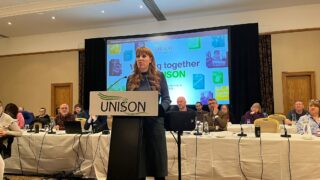Housing workers or care workers, staff at small or large charities: whatever part of UNISON’s community service group delegates represented they told a similar story at their conference in Southport this weekend.
Stephen Thomas from Northern region may have been talking to a specific motion on funding social care, but he spoke to a much wider experience when he described “a broken system held together by the compassion and dedication of an exploited workforce.”
In debate after debate on motion after motion and over two days, conference discussed how to tackle common problems of underfunding and the low pay, plus attacks on terms and conditions, that follow.
Louisa Shuman from Cymru /Wales pointed to one of the worst examples when she told how she and her colleagues had been dismissed and re-engaged by a charity trying to deliver a service on a reduced budget from the commissioner.
Their new terms saw sick pay cut to the statutory minimum, maternity and paternity pay likewise reduced to the statutory entitlement, annual leave down from 35 days a year to the 28 days the law demand … and the list went on.
“Low pay is endemic in the sector,” said Jill Dale of the union’s major charities sector committee, telling of staff at a large children’s charity “who use food banks to feed their own children.”
In fact, she said, “I earn in a year what my HR director takes home in a month”.
That was a point repeated by Debbie Hollingworth of the national women’s committee, who said it was far too common that “those at the top of the tree receive vast amounts of money, while those at the bottom often don’t get the minimum wage.”
Conference called for a range of measures to inform and support reps and members in an often poorly organised sector.
But Debbie Hollingworth reminded delegates of the struggle to secure payment for homecare workers for the time they spent travelling between clients.
Although there are still rogue employers out there, she said: “This was a battle we took on, and a battle we won. Which proves we can do it.”





